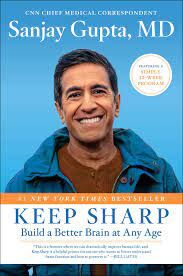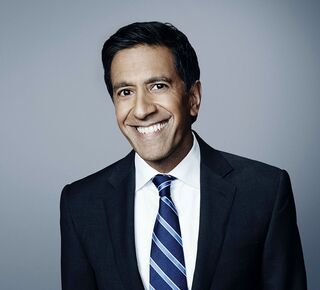Stress
Simple Ways to Keep Your Brain Sharp
In his book, Dr. Sanjay Gupta writes the prescription for a healthy brain.
Posted June 30, 2021 Reviewed by Chloe Williams
Key points
- The book "Keep Sharp" outlines key habits that contribute to brain health, such as moving, relaxing, nourishing our bodies and connecting.
- Physical exercise is scientifically documented to improve brain health and function as exertion helps repair and maintain brain cells.
- Other important factors for brain health include sleep, which clears waste and fluid from tissues, and mindfulness techniques.
Most people aren’t fixated on brain health until they have to be. Turning the pages of Keep Sharp: Build a Better Brain at Any Age, readers—and not just baby boomers—will concur that they have to be concerned.
Sanjay Gupta, MD, chief medical correspondent for CNN and associate professor of neurosurgery at Emory University School of Medicine, describes how he became engrossed as a teenager by his grandfather’s stroke. Brain health he reports is less about our performance on memory exams and a lot more about “propagating new brain cells and making the ones you have work more efficiently.” It’s about habits. Resiliency. Dispelled myths and simple truths to live by.

Simple truths such as moving our bodies, so that physical exertion increases in order to repair and maintain our brain cells. In fact, physical exercise is “the only thing we’ve scientifically documented to improve brain health and function,” he writes.
Discover a new hobby or habit to strengthen cells. Relax, the doctor writes, because “stress is particularly subversive.” Chilling out prevents the cascade of cortisol to inflammation—something we want to avoid.
Nourish brain cells with food and beverages (like H2O) that keep the brain focused, helping to avoid memory loss and brain decline. Since our brains are 73 percent water, Gupta explains, it only takes 2 percent dehydration to affect attention, memory and cognitive skills. Yes, a few ounces of water can reverse that. The gut microbiome (the trillions of bacteria in the intestines) plays a profound role in brain health.
Finally here: Connect with others, for this improves brain plasticity and preserves cognitive abilities. Interacting with humans reduces stress and boosts the immune system. “People with fewer social connections,” Dr. Gupta writes, “have disrupted sleep patterns, altered immune systems, more inflammation, and higher levels of stress hormones.”
Myths Busted and Science Explored
While dolling out explanations and prescriptions or fixes, Dr. Gupta busts several myths, too many to detail in this post.
Highlights, however, include that dementia is not inevitable, older people can learn new things, we have more than five senses, and we are not dominated by one left or right brain. Think codependency there!
Most of us wouldn’t consider neuroscience an evening pastime. Dr. Gupta intuitively realizes this. He presents complicated concepts with just the proper amount of science and nomenclature but never too much to lose us in it. Even when discussing the plaques and tangles of Alzheimer’s, he outlines eight potential ways the brain begins to break down, sharing from news headlines and research we might recognize.
These include genetic risk factors, metabolic disorders, head trauma and injury, toxic substances and infections.
Changing Our Understanding and Behaviors
Hands down, the most profound takeaways are the habit overhauls that Gupta recommends, or at the very least gets us to consider. "The Miracle of Movement" chapter is worth devouring because research has shown that our physical and mental health improves with exercise.
The importance of sleep is parceled out in various places. “Sleep is anything but a waste of time,” Dr. Gupta writes as he outlines how sleep is our body’s rinse cycle, clearing waste and fluid from tissues via the lymphatic system.
Relaxation strategies such as hobbies, reading, games are good but even more so is mindfulness. Breathe deeply. Use guided imagery and progressive muscle relaxation—techniques therapists often recommend for anxious clients. Dr. Gupta recommends it for all. What’s more, express gratitude. Forgive others. Laugh more. Volunteer in the community to lessen anxiety, depression and social isolation. Declutter your life because mess creates stress and disorganization equates to distraction, he reports.
And back to nourishment, what we consume, or avoid, also gets emphasized. Limit cookies, bagels and baked goods. Read labels for “diet,” “lite,” and “no sugar” since it’s likely that the cumulative consumption of artificial sweeteners may lead to metabolic dysfunction (insulin resistance, diabetes, and obesity).
Eat more fresh vegetables, especially leafy greens, whole berries, fish and seafood, olive oil, avocado and whole eggs as well as seeds and nuts. His B-List foods include beans and legumes, other whole fruits, low sugar, low-fat dairy, poultry and whole grains.
The C-List is where Dr. Gupta advises we set limits—things like fried, sugary and processed foods, red meat and whole dairy, which is high in saturated fat (such as cheese and butter) and salt. When you’re hungry, “drink instead of eat,” he writes explaining that most of us walk around stuffed on food but “chronically dehydrated.” Alcohol doesn’t count for hydration, and while studies have shown that coffee and tea (with their antioxidants) may help decrease the risk of cognitive decline, water is still the absolute best.

Sanjay Gupta delivers on his promise. He makes us think as we aim to push the limits on human longevity. He’s written using common parlance along with a carefully cited notes section to back up his recommendations.
Sure, there may be skeptics who may not prefer the network that hosts his reporting, but Gupta’s passion for the brain knows no media alliances here. View this as wise counsel with a host of suggestions that ought not be ignored.
Copyright @ 2021 by Loriann Oberlin. All Rights Reserved.
Related Posts:
References
S. Gupta, Keep Sharp: Build a Better Brain at Any Age (New York: Simon and Schuster, 2021).




